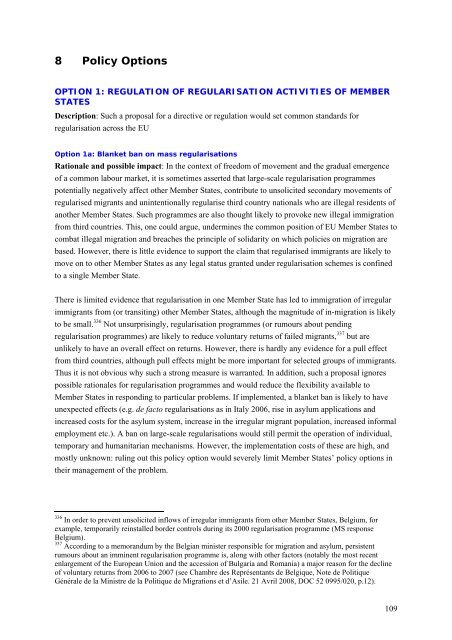REGINE Regularisations in Europe Final Report - European ...
REGINE Regularisations in Europe Final Report - European ...
REGINE Regularisations in Europe Final Report - European ...
Create successful ePaper yourself
Turn your PDF publications into a flip-book with our unique Google optimized e-Paper software.
8 Policy Options<br />
OPTION 1: REGULATION OF REGULARISATION ACTIVITIES OF MEMBER<br />
STATES<br />
Description: Such a proposal for a directive or regulation would set common standards for<br />
regularisation across the EU<br />
Option 1a: Blanket ban on mass regularisations<br />
Rationale and possible impact: In the context of freedom of movement and the gradual emergence<br />
of a common labour market, it is sometimes asserted that large-scale regularisation programmes<br />
potentially negatively affect other Member States, contribute to unsolicited secondary movements of<br />
regularised migrants and un<strong>in</strong>tentionally regularise third country nationals who are illegal residents of<br />
another Member States. Such programmes are also thought likely to provoke new illegal immigration<br />
from third countries. This, one could argue, underm<strong>in</strong>es the common position of EU Member States to<br />
combat illegal migration and breaches the pr<strong>in</strong>ciple of solidarity on which policies on migration are<br />
based. However, there is little evidence to support the claim that regularised immigrants are likely to<br />
move on to other Member States as any legal status granted under regularisation schemes is conf<strong>in</strong>ed<br />
to a s<strong>in</strong>gle Member State.<br />
There is limited evidence that regularisation <strong>in</strong> one Member State has led to immigration of irregular<br />
immigrants from (or transit<strong>in</strong>g) other Member States, although the magnitude of <strong>in</strong>-migration is likely<br />
to be small. 336 Not unsurpris<strong>in</strong>gly, regularisation programmes (or rumours about pend<strong>in</strong>g<br />
regularisation programmes) are likely to reduce voluntary returns of failed migrants, 337 but are<br />
unlikely to have an overall effect on returns. However, there is hardly any evidence for a pull effect<br />
from third countries, although pull effects might be more important for selected groups of immigrants.<br />
Thus it is not obvious why such a strong measure is warranted. In addition, such a proposal ignores<br />
possible rationales for regularisation programmes and would reduce the flexibility available to<br />
Member States <strong>in</strong> respond<strong>in</strong>g to particular problems. If implemented, a blanket ban is likely to have<br />
unexpected effects (e.g. de facto regularisations as <strong>in</strong> Italy 2006, rise <strong>in</strong> asylum applications and<br />
<strong>in</strong>creased costs for the asylum system, <strong>in</strong>crease <strong>in</strong> the irregular migrant population, <strong>in</strong>creased <strong>in</strong>formal<br />
employment etc.). A ban on large-scale regularisations would still permit the operation of <strong>in</strong>dividual,<br />
temporary and humanitarian mechanisms. However, the implementation costs of these are high, and<br />
mostly unknown: rul<strong>in</strong>g out this policy option would severely limit Member States’ policy options <strong>in</strong><br />
their management of the problem.<br />
336 In order to prevent unsolicited <strong>in</strong>flows of irregular immigrants from other Member States, Belgium, for<br />
example, temporarily re<strong>in</strong>stalled border controls dur<strong>in</strong>g its 2000 regularisation programme (MS response<br />
Belgium).<br />
337 Accord<strong>in</strong>g to a memorandum by the Belgian m<strong>in</strong>ister responsible for migration and asylum, persistent<br />
rumours about an imm<strong>in</strong>ent regularisation programme is, along with other factors (notably the most recent<br />
enlargement of the <strong>Europe</strong>an Union and the accession of Bulgaria and Romania) a major reason for the decl<strong>in</strong>e<br />
of voluntary returns from 2006 to 2007 (see Chambre des Représentants de Belgique, Note de Politique<br />
Générale de la M<strong>in</strong>istre de la Politique de Migrations et d’Asile. 21 Avril 2008, DOC 52 0995/020, p.12).<br />
109
















